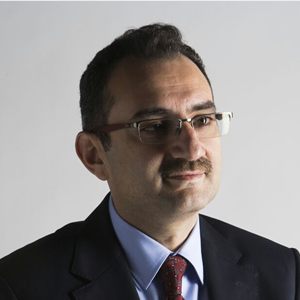Industry Thought Leadership
Delivering Value Where it Works
October, 2017The use and sophistication of technology are expanding exponentially, and enterprises’ dependence upon them is growing in tandem. We are turning into a smart society, reliant upon digital, automated machinery to keep our world running smoothly. All industries—from healthcare to government to education—are affected by these changes, and all industries are becoming more interconnected and more complex. As industries integrate and customer demands evolve, enterprises need to be more open and flexible in order to stay competitive. In this environment of change, Huawei seeks build and nurture the ICT ecosystem in the budding smart society of the Middle East – providing the ‘soil’ (platforms and infrastructure) and ‘sunlight’ (impetus for strong alliances) that push the industry forward and promote ongoing social progress.
Huawei owes its success in becoming a global leader in the ICT industry to a two-pronged strategy: firstly its prioritization of a customer-centric approach to innovation, and secondly the collaborative partnerships it has forged with partners to ensure that end-users gain maximum value from its innovative solutions. The latter is Huawei’s Transforming Together channel strategy that recruits and enables a core community of trusted partners who bring with them a keen understanding of local market needs that is essential to delivering value.
As of the start of 2017, Huawei has more than 12,000 channel partners and 2,000 service partners working to deliver solutions to private and public enterprises, and governments around the world. Huawei collaborates with players across the value chain, including upstream and downstream partners, to jointly develop high quality and build long-term competitiveness in quality. Their over 400 solutions partners include industry leaders.
Huawei’s channel partners play an important role in delivering sustainable market growth in the region. Huawei’s priority in the Middle East is to create solutions that are optimally tailored to the needs of key sectors in the region, and this business objective works in tandem with its channel strategy to ensure that channel partners are empowered to be vertical-focused. Through strategic and close collaborations, Huawei strives to develop and deliver business-driven ICT solutions that will help enterprises to adapt to changes brought about by the digital transformation in each vertical sector, thus ensuring the economy has a smooth transition into the Digital Age.
To illustrate this point, one could look at the diversity of uses to which Huawei’s IoT solutions have been adapted. In 2016, Huawei announced a partnership with Intel Corporation to combine the latter’s X86 Platform with the former’s IoT gateway. The resulting technology allowed buses across Dubai to incorporate in-vehicle surveillance, passenger tracking, emergency services communication, and real-time health data analysis of the vehicle. Similarly, Huawei collaborated with the free zone technology park Dubai Silicon Oasis Authority (DSOA) to create the first smart street solution.
The basic IoT technology was the same, yet in this case the emphasis was on environmental sensors that monitored outdoor temperature, air quality and humidity, resulting in better energy conservation and efficiency. This is only two of a myriad of uses to which IoT solutions can be adapted, and demonstrates how Huawei works with partners to tailor different solutions to different vertical sectors.
Huawei has worked with over 500 partners to provide cloud computing solutions for customers in over 130 countries and regions. The company has delivered over 2 million virtual machines and 420 cloud data centers, and became a Platinum Member of the OpenStack Foundation in March 2017.
In the transportation sector, Huawei works with more than 60 industry partners to develop collaborative solutions for road, rail and air transportation. Over 220,000 kilometers of railways and highways, are powered by Huawei’s digital urban rail solutions. 15 airports with annual traffic of over 30 million passengers rely on Huawei’s smart airport solutions.
Huawei seeks to ensure that its partners across the region have the knowledge and expertise to showcase how these solutions can deliver impactful results. Huawei’s channel program provides partners with a wealth of information and education, giving them the tools to realize the full potential of new ICT solutions to transform their customers’ businesses. Customers can improve their individual employees and departments’ work efficiency through Huawei’s training and certification services and offer employees a suitable technical development path. Huawei’s specialized training and technical knowledge programs include the Huawei Certified Internetwork Expert (HCIE). HCIE certification acknowledges the skills of an organization to construct, optimize, and manage complex large and medium-sized enterprise networks. It enables channel partners to offer more confidence in service delivery to their valued customers and end users. Huawei also partners with educational institutions like universities to improve the effectiveness of the learning material for their students and improve the students’ competitiveness.
While the process of digitalization speeds up, new technologies, new players, and cooperation modes emerge, allowing customers more control and power while collaborating with partners in the ecosystem. The ICT industry is becoming more and more ‘developer-defined’, and Huawei remains committed to its customers and partners while building a developer-defined ecosystem through joint innovation.
Huawei is dedicated to its mission of having a positive influence on the community in the Middle East. The most effective way for a corporation to make a long-lasting impact on a community is by building local capabilities and empowering them to play an active role in the economic growth of their nations.
Based on a deep understanding of customer needs, Huawei continues to build the partner ecosystem that empowers its customers to deliver innovative, customized and impactful solutions that are helping their governments reach the goals set out in their respective national visions and plans.
In order to keep building a Better Connected World, Huawei will stay customer-centric, pursue shared success, and create a sustainable ecosystem. It will step up efforts to develop and invest in industry alliances, business alliances, open source communities, and developer platforms, fully leverage its partners’ advantages to grow the industry as a whole, and form a symbiotic, interdependent, and regenerative community of common interests.

